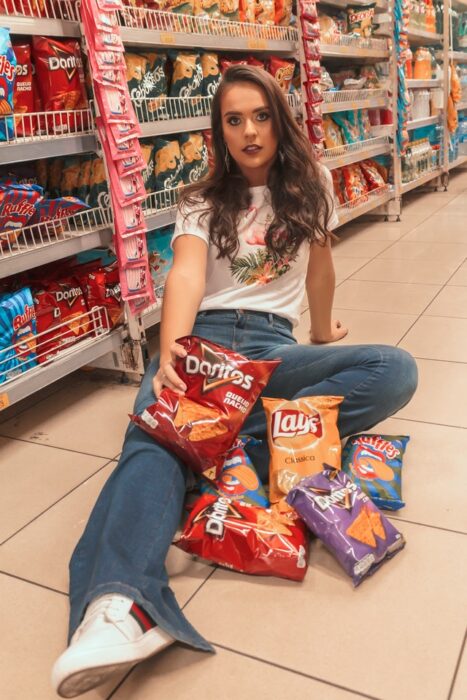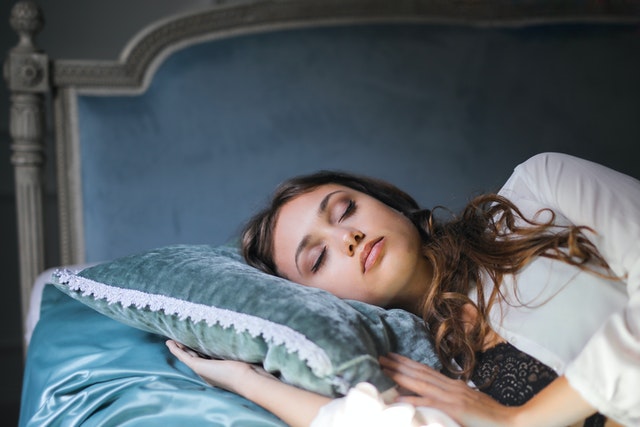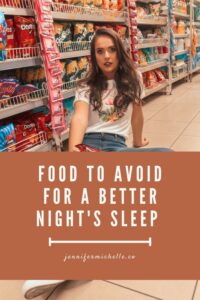I earn a small commission via affilate links at no extra cost to you.
If you’re not sleeping well it’s easy to get caught in a negative feedback loop. If you’re not eating the right kinds of foods you won’t sleep well. When you don’t sleep well you end up stressed which triggers cravings for food that further hinders your sleep health.
When you don’t get enough quality sleep your appetite and hunger hormones, leptin and ghrelin, can become imbalanced. An imbalance triggers cravings for high carbohydrate foods and a desire for foods linked to weight gain.
People who are overweight are most often caught in the negative food-sleep cycle. If you’re overweight you have a higher risk of developing sleeping disorders like sleep apnea. To compound the issue, when you don’t get enough sleep it puts you at higher risk for obesity and heart disease. Weight gain hinders sleep and not sleeping creates more weight gain.
A sleep and weight gain study found after 12 months, for every 30 minutes of weekday sleep debt, the risk of obesity was 17% higher and the risk of insulin resistance 39% higher.¹
Fatigue drives cravings for unhealthy foods, you’re too tired to exercise, body weight accumulates, you don’t sleep well, and then you have more cravings for foods that won’t help you sleep.
No matter how much you weigh we’ve all had nights when we’ve struggled to sleep. When it comes to your overall health, sleep is a crucial component. Your diet affects your sleep and digestion and your digestion affects how well you sleep. The key is knowing the foods that help you sleep and the foods that don’t.
How Your Diet Impacts Your Sleep
Every cellular process in your body relies on nutrients. If your body isn’t receiving the right ratio of macronutrients (protein, fat, and carbohydrates) it can hinder your body’s natural production of sleep hormones like melatonin.
When looking to food for better sleep keep in mind the body handles different sources of fat, carbohydrates, and protein differently. Carbohydrates from vegetables are metabolized by the body much differently than desserts even though they both contain carbohydrates.
Foods that help you sleep should contain vitamins and minerals. Naturally occurring nutrients in whole foods are your best source of nutrition. Don’t rely on fortified foods to get the job done because they often contain anti-nutrients that prevent absorption. Be mindful that what you eat isn’t always fully absorbed, especially if your gut health is a bit off.
The good news is the foods that help you sleep are easy to find. Eggs, red meat, dark leafy greens, salmon, bananas, and mushrooms are examples of simple foods that help you sleep better. As they say, stick to the perimeter of the grocery store: meat, seafood, eggs, vegetables, nuts, seeds, animal fats, and seasonal fruit provide an insane amount of nutrition.
Dr. Wahls protocol is a version of paleo comprised of the foods I just mentioned. The paleo diet is 2–10 x more nutrient dense than the government’s recommended daily allowance depending on the nutrient. If you don’t think food matters that much I urge you to watch the video below and learn about her story, and learn what’s likely missing from your food.
You already know caffeine can hinder your sleep quality. For a typical person, caffeine remains in the blood for roughly 6 hours after you consume it.² Reducing your intake of caffeine or limiting caffeine consumption to the early hours of the day is an easy first step to make. If you can, try not to consume any caffeine after 2 pm.
According to the FDA, the daily consumption of caffeine that’s considered safe is 400mg.³ Using coffee as an example, an 8 oz cup can contain anywhere from 95–200mg of caffeine depending on beans and brew strength. Of course, tea, energy drinks, chocolate, and soda will each contain varying amounts as well. Keep these things in mind when assessing whether it’s a food for better sleep.
Five Essential Nutrients that will Help You Sleep
You’ve likely heard of people using melatonin to help them fall asleep. What if you knew which foods can help support your body’s own natural melatonin production?
Tryptophan is an amino acid that helps the body produce serotonin and melatonin. Melatonin and serotonin both help support a good night’s sleep. Chia, sesame, pumpkin, and sunflower seeds are all excellent sources of tryptophan. Nuts, bananas, red meat, poultry, and eggs are also good sources.
In the Journal of Research Medical Science a study found magnesium improved the sleep quality of elderly participants.[4] Dark leafy greens are a great source of magnesium. They’re also rich in iron, calcium, potassium, and many of the B-vitamins. Nuts, seeds, and bananas are also great sources of magnesium.
Obtaining all 8 of the B-vitamins can support a good night’s sleep. Thankfully you can get a variety of B-vitamins from a number of the foods mentioned in this article such as dark leafy greens, eggs, poultry, meat, and salmon.
Wild caught fish, and grass fed and pasture raised animals are excellent sources of omega 3 fats. Omega 3 fats have an anti-inflammatory effect on the body which can support overall health. Omega 3 fats in combination with Vitamin D have been shown to improve sleep in study participants.
Not only has Vitamin D been shown to improve sleep, studies have linked Vitamin D deficiencies to sleep disorders. Foods that contain the most Vitamin D, fish, are also high in omega 3 fats. Egg yolks contain a bit of Vitamin D, and so do mushrooms, but fish is truly the best dietary source. Always look for wild and sustainably caught fish. Sensible sun exposure also supports your body’s ability to make its own Vitamin D.
Cortisol is the hormone that wakes you up in the morning which means elevated levels at night will make it difficult to fall asleep. In the body think of cortisol and melatonin working as opposites. If your circadian rhythm is out of balance, most often due to blue light from screens, it’s possible you may have too much cortisol at the end of the day. In the morning sunlight sends a signal to the body to wake you up and it responds by releasing cortisol. Blue light from screens and LED bulbs makes the body think the sun is up, it hinders melatonin production. Melatonin should rise naturally in the evening to make you feel ready for bed. Melatonin rich foods that help you sleep are: strawberries, pistachios, walnuts, kiwi, tomatoes, bell peppers, and tart cherries.
Eating more foods that help you sleep likely won’t produce results overnight. In fact if you make an immediate dietary switch your sleep might get worse before it gets better. (It’s because your body is likely trained to prefer carbohydrates for fuel and the paleo diet is much lower in carbohydrates.) A gradual transition is sometimes better, but better sleep inevitably follows.
You don’t need anything expensive to get a better night’s sleep so this formula is accessible to everyone. Our world is filled with delicious foods rich in vitamins and minerals to help support a good night’s sleep. Many of these foods can be grown in your own backyard or on the patio. You can make Vitamin D from sunlight which in turn supports the production of serotonin and melatonin.
If it all feels a bit overwhelming focus on adding in more of the foods I mentioned above. As you add more food for better sleep it automatically makes less room for the foods that hinder your sleep.
Foods to Avoid for Sleep Health
There’s a general consensus that certain foods can make sleep challenging. Caffeine is one of the most obvious culprits. It’s a stimulant that wakes you up. It’s the opposite of what you’re looking for. While coffee is a popular choice, be mindful that chocolate, soda, energy drinks, weight loss products, tea, and even decaffeinated coffee can contain caffeine.
A common misconception is that alcohol supports your ability to sleep. However, while it might make it easier to fall asleep it also makes it more difficult to stay asleep. Overall, alcohol does not support sleep health, gut health, or health in general. Plus, who has the time or the energy to manage the symptoms of drinking the night before?
Certain fatty foods can also affect your sleep health. Keep in mind that fats are not all the same. Omega 3 fats found in fish will support a good night’s sleep whereas the fats found in deep fried food (omega 6 fats) will hinder your ability to sleep. Any foods that give you indigestion like fast food or spicy foods can make it difficult for you to fall asleep.
Although high carbohydrate foods with high glycemic indexes can make you feel drowsy they actually make your sleep health worse. High carbohydrate foods have been shown to increase the number of times you’ll wake up during the night. They reduce the amount of deep sleep you get.
High carbohydrate foods to avoid are things like refined grains, processed food, many desserts, sodas, and juices. Carbohydrates found in whole fruits and vegetables contain vitamins and minerals that support sleep, and they contain an adequate amount of fiber to offset the sugar they contain.

Should You Eat Late At Night?
There isn’t a set rule for when you should stop eating at night but there are some factors to consider. First think about what you had for dinner. If you find yourself hungry between meals, or after dinner then your last meal failed you. Reflect on what you ate and think about why it didn’t truly fill you up. It’s a learning process so the next day make changes to your dinner and see if it fills you up. Another thing to note, are you eating out of habit or are you genuinely hungry? Sometimes we simply feel compelled to eat because we’re watching TV. Be mindful of yourself.
If your goal is to eat more foods that help you sleep it’s important to understand how the digestive system works at night. At night your digestive system gets a break and the body uses this time to grow, repair, and rebuild itself. Sleep deprivation creates inflammation that can create more digestive issues. This is why a good night’s sleep can help support proper digestion.
When you eat a large meal before bed you’re not giving your body the space to relax and address gut health issues. It’s best to try to consume the bulk of your calories early in the day in order to support the body’s night time healing processes. Enjoy an early dinner that doesn’t leave you feeling stuffed.
Eating a large meal just before bed can potentially disrupt your sleep. You might already be aware of how your digestive issues and meal timing affect your ability to fall asleep. Lying down diminishes the effect gravity has on the digestive system. If you lie down on a full stomach it’s possible to experience acid reflux.
If you find that you have difficulty falling asleep after a large meal late at night, try to give yourself a 1–3 hour break between your last meal of the day and bedtime. Of course, if your stomach is rumbling before bed it’s ok to have a small snack. Hunger pangs won’t support a good night’s rest either.
- https://www.goodreads.com/book/show/28401348-go-to-bed
- https://www.nbcnews.com/better/health/how-what-you-eat-affects-how-you-sleep-ncna805256
- https://www.sleepfoundation.org/nutrition/caffeine-and-sleep
- https://www.samhealth.org/about-samaritan/news-search/2020/07/13/five-essential-nutrients-for-better-sleep
Originally posted on April 18, 2022 @ 08:00







